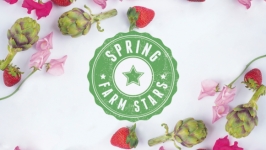Row 7 Seed Startups
If you shop at local farmers markets like those in Los Altos and Campbell, you might come across an oddly shaped squash or a gorgeous elongated orange beet or an unusual pepper. It just might be a gem grown from seeds from a young company called Row 7, which is partnering with organic seed breeders, farmers and chefs to create new varieties of organic vegetables designed with one thing in mind: flavor.
That might sound like an obvious objective for seed breeding, but it’s not the case with the seeds that grow much of the food we eat. Large companies breed seeds to meet the needs of the modern food system—meaning uniformity in appearance, pest control, transportability, long shelf life, high yields and agricultural chemical usage. Flavor has become an afterthought in large, monoculture agriculture.
But not everywhere. There are plenty of seed breeders developing unique and flavorful new vegetable varieties. However, unless a seed company is able to market them, the innovation will go nowhere.
That’s where Row 7 comes in. Co-founded by celebrity chef Dan Barber, seedsman Matthew Goldfarb and Cornell University plant breeder Michael Mazourek, Row 7 is betting that when chefs and breeders collaborate to grow what’s most delicious, they will capture the attention of eaters and home gardeners and farmers who will order the seeds in bulk. The new varieties will be introduced and publicized by notable chefs in their restaurants, then in farmers markets and high-end grocery stores—and, if demand is high enough, ultimately in national supermarket chains.
It’s already happening right here in our area. Chefs like Alice Waters are part of the collaborative network created by Row 7, along with restaurants such as Los Gatos–based Manresa who source their Row 7 vegetables from certified organic farm Spade & Plow.
“Row 7 is definitely raising the bar in creating the next generation of chefs and farmers,” said Sam Thorp, co-owner of Spade & Plow. “And Dan Barber’s stature in the culinary world has given Row 7 the clout to get people aware and excited about these new varieties, where flavor is paramount.”
Row 7 is currently selling seeds through its website for 11 new varieties of chef-inspired vegetables. There’s the tiny, hand-sized 898 squash, which is more nutritious than butternut and sweet enough to eat without adding maple syrup. Another is the gorgeous Badger Flame beet, which is mild, sweet and can be eaten raw. The Habanada pepper has the aroma and sweetness of a habanero without the heat. The Robin’s Koginut squash resembles a small pumpkin and offers a sweet, smooth texture. The Upstate Abundance potato is buttery even without butter. And the 7082 cucumber has the traditional flavor that watery supermarket varieties have lost.
Just how are seeds for new varieties of vegetables created? Two ways are through cross-pollination and through genetic engineering.
For thousands of years, plants have been cross pollinated to produce offspring that share the best characteristics of the parent plants. Whether pollinated by wind and bees, or done by hand in controlled greenhouses, the resulting varieties all hail from the same species. The result can create natural varieties that are tasty, nutritious, insect resistant and heartier than their parents.
According to a recent National Geographic article, genetically modified seeds—the kind that are created in laboratories—are found in about 60% of all the processed food you find in supermarkets, from pizza to baking powder. Using genetic engineering technology, companies are selecting and implanting genes from a variety of different species—like bacteria and even insects and animals—to create characteristics such as long shelf life or adaptation to chemical inputs. Bred to support the needs of big agriculture, the seeds cannot be called organic.
In contrast, Row 7 seeds are organically bred from inception to release—and are not GMO. The company believes that, “The most flavorful and resilient plant varieties are best created by working with the full genetic heritage of a crop. We utilize time-proven techniques of cross-pollination and selection complemented by modern technology, but we draw a clear line at genetic engineering. It doesn’t advance the changes we seek in the food system, and it’s never produced anything truly delicious.”
Look for Row 7 vegetables on menus and in your farmers market this spring. Or try your hand at growing your own from seed. Deliciousness grows from the ground up with help of local farmers, chefs and Row 7 vegetable newcomers.
Get tasting!


